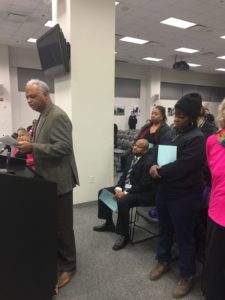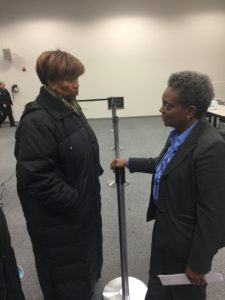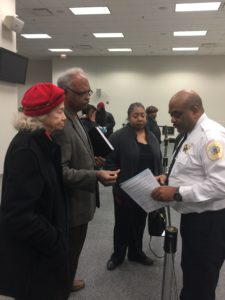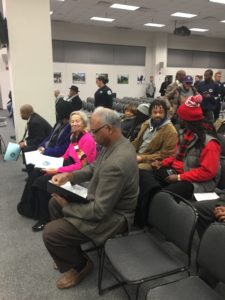On Thursday, February 16, 2017, ten members of CANA attended the Chicago Police Board Meeting. The Chicago Police Board is a nine member, civilian body that oversees certain activities of the Chicago Police Department. It holds monthly public meeting that provide members of the public the opportunity to present questions and comments directly to the Board, the Superintendent of Police and the Chief Administrator of the Independent Police Review Authority.
Given our continued lack of a sense of safety in our community, CANA chose to once again present our concerns and questions directly to the senior management of the Police Department. As required, in advance of the meeting, two members of CANA requested inclusion on the list of speakers.
Although anyone can sign up to speak to the Board directly, several audience members chose to shout comments and commentary from their seats. Other audience members found this behavior to be disruptive since it was often at a volume and frequency that prohibited the scheduled speakers from being heard.
The overarching theme for almost all of the speakers was the failure of the police department to provide a sense of safety. In summary they spoke on:
- Failure to address the racism within the Department
- Disappointment with the work of the Police Superintendent and the Police Board Chairman
- Police harassment
- Dissatisfaction with handling of police shootings
CANA speaker Serethea Reid spoke on the dissonance between the Police Department’s stated mission to develop a positive relationship with the community and its actions.
There does not exist a measurable, documented means for the Police Department to evaluate officer performance as it relates to the achievement of effective community policing. The department has failed to take the key step of clearly articulating objectives and competency requirements for successful community policing.
This failure represents a lack of real commitment. This lack of commitment is further illuminated by the fact that promotions are not negatively impacted by a consistent failure over time to police compassionately or with respect for all segments of the public.

Ron Reid
CANA speaker Ron Reid spoke on what real community policing looks like in high crime areas. He also touched on when and how do we hold our public servants accountable.
Measurable and tracked goals, objectives and actions for positive community interaction for every officer must be established and tied to performance evaluations. Officers should engage in daily positive contact with as many residents in their beat spread over as many blocks as possible, to build relationships. There should be increased tracking and communication of issue closure rates. Resident satisfaction surveys should accompany the reports.
Residents feel that they have done all that they can possibly do to get the Police Department. Where do you go next for relief after:
- regular communication with the Police Commander and the Alderman
- attendance at CAPS meetings
- use of phone tree
- organizing a 16 block association
- planning quality of life events with group outing
- planting flowers on 21 corners
- getting training from the Better Government Association
- providing information on the same drug hot spots for five years
As the members were speaking, all of the CANA members stood to express their support and to indicate the level of our community’s of commitment. No other community sent representatives.
Several members of the Police Board expressed a positive reaction to our presentation. They stated that the message was clear.

Judge Marianne Jackson and the Chairman of the Police Board
The Police Superintendent made himself available, after the conclusion of the formal Police Board meeting, to listen to attendees on an individual basis. At that time several other CANA members were able to present their concerns and questions directly. He promised to get back to us directly after he has had a chance to review our specific concerns

Police Superintendent with CANA members
If we want change we must stand up and demand it. We cannot rely solely on our elected officials and public servants to deliver the quality of service that we deserve without input from us. We can’t rely on others to do for us.
Unfortunately residents of the most distressed communities, which have suffered from long-term disinvestment, must employ a greater percentage of their human and personal capital than is required from Chicago communities that have enjoyed the majority of the city’s investments for decades.

CANA members in audience
You must continue the work.





